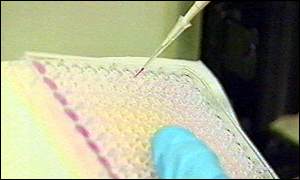Gene therapy 'prevents cancer'
URL: http://news.bbc.co.uk/hi/english/health/newsid_1191000/1191334.stm
Date accessed: 16 March 2001
Monday, 26 February, 2001, 22:01 GMT

So far, the major hurdle for gene therapy has been that it is hard to
deliver to the right tissue in the body
|
|
Professor Gordon McVie, Cancer Research Campaign
|
The technique cannot cure cancer, but the researchers think it may help prevent the disease from developing in the first place in vulnerable people, such as smokers.
It may also help speed the development of more effective anti-cancer drugs.
Damaged cells
Researcher Professor Kay Huebner, of Jefferson Medical College in Philadelphia, US, said: "We were pretty surprised that it worked so well.
"We knew we could kill cancer cells in the laboratory, but we didn't know if the viruses would get eaten up by the stomach juices. We expected differences, but not so dramatic."
The researchers targeted a gene called FHIT, which is damaged in many common forms of cancer, such as those affecting the breast and colon. FHIT causes damaged cells to commit suicide before they can start the out-of-control growth of cancer.
When the gene is defective, the cells are able to keep dividing in the uncontrolled manner typical of cancer. The gene can be damaged by toxins, such as those found in cigarette smoke.
Specially bred
Professor Huebner's team bred mice that did not have the FHIT gene.
These mice were vulnerable to developing a condition that resembles the human disease Barrett's oesophagus, an irritation of the throat that can lead to oesophageal cancer.
The mice were exposed to a chemical known to cause oesophageal cancer. However, mice who were then given gene therapy to provide them with a working copy of the FHIT gene appeared to be protected from developing cancer.
The researchers found that the most effective way to give the mice a copy of the FHIT gene was to attach it to a virus, called an adeno-associated virus.
This virus is thought to be particularly safe because it does not cause disease in humans.
'Step forward'
Lead researcher Dr Carlo Croce said: "I predict the disease we will prevent first will be Barrett's oesophagus.
"The next will be bronchial dysplasia. Most heavy smokers have bronchial dysplasia, which will later lead to lung cancer."
The findings may help to combat a range of cancers in which the FHIT gene is damaged. These include cancer of the lung, colon, breast and bladder.
Professor Gordon McVie, director general of the UK's Cancer Research Campaign, told BBC News Online that developing a form of gene therapy that could be taken orally would be a major step forward.
He said: "So far the major hurdle for gene therapy has been that it is hard to deliver to the right tissue in the body.
"The only effective method of delivery so far has been direct injection, but cancer spreads, and one cannot go round the body sticking a needle into every area where the cancer occurs."
The research is published in the Proceedings of the National Academy of Sciences.
Category: 32. Genome Project and Genomics